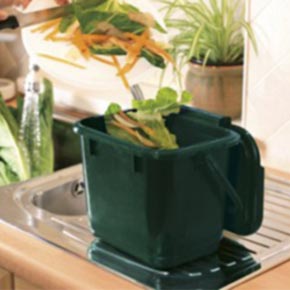There are a number of items that you can recycle at home from your kitchen. 
Food Waste ~ You can now recycle your food waste using your food caddy. All your cooked and uncooked food waste can go into your caddy. The caddy can be lined using a compostable liner or newspaper alternatively you can put food straight into it. Once your caddy is full empty it into your brown lidded bin.
Know your dates - A lot of food is thrown away across Britain making sure you know the difference between what dates mean on food labels as it is really important and can help you waste less.
"Use by" - is used for safety guidance. Food should not be eaten after its use by date as there is a safety risk. It can however be used or frozen right up until this date to be used at another time.
"Best Before" is used as a guide in relation to the items quality, you can eat something after this date however it may not be at its best.
"Sell By" or "Display Until" are for the retailers’ reference and refer to internal stock control.
Further information on making the best use of leftover food can be found be visiting love food hate waste.
Cardboard - Including cereal boxes, washing powder boxes, cardboard sleeves all can go in your blue topped bin ready to be recycled. You can also recycle Takeaway Pizza boxes as long as there is no food left in them and the card isn't greasy.
Glass bottles / Jars - Rinse any glass before you recycle them. Lids and tops can be left on however corks should be removed. Natural cork can be composted by slicing it thinly and placing on a compost heap.
Plastic Bottles, Butter and Margarine tubs - Many plastics can be recycled including bottles tubs and trays. Remember to wash and squash any plastic items this will make more room in your recycling bin. Plastic films however need to be disposed of in your green lidded household waste bin.
Metal cans and tins - Metal food tins including pet food tins, larger tins used for storing biscuits and sweets can also be recycled. Drinks cans can also be recycled.